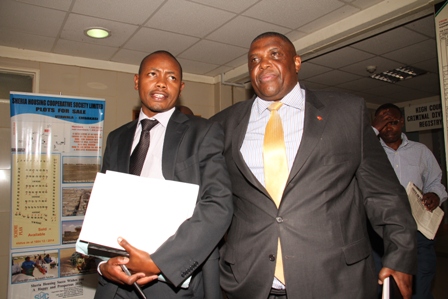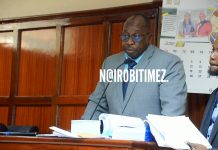
Lawyer Waithaka Ngaruiya with Political activists David Matsanga leaving Milimani law courts after high court ordered the matter seeking the disclosure of the contents in the Waki report should be heard by a bench of judges on Friday February 5, 2016.
BY SAM ALFAN.
The court has ordered that a matter seeking the disclosure of the contents in the Waki report should be heard by a bench of judges.
High court Judge Isaac lenaola in his ruling on Friday agreed with firely activist David Matsanga that the matter raises weighty issues.
He thus directed that it should be heard by more than one Judge, uneven number of judges.
He said the file be taken to the chief Justice to appoint a bench that will hear the matter.
“I direct the matter be taken to Chief Justice Willy Mutunga who will select a three judge bench panel to hear the case, “said Leanola.
This is after political scholar David Matsanga and John Kimani moved to the high court lawyer Waithaka Ngaruiya to order Justice Phillip Waki, Office of the Prosecutor of ICC, and the Attorney General to ordered to publish and publicize, the entire full and proper report prepared by the commission of Inquiry into the Post-Election Violence (CIPEV) including the secret envelope containing the names of persons suspected to have borne the greatest responsibility for the postelection violence, which was submitted to Annan.
According to the court documents filed in court the petitioners David Matsanga and John Kimani argues that on 13 February Matsanga he filed an application at the ICC challenging the admission of the report by the commission of Inquiry into post-election Violence (CIPEV) as evidence in the case of the Prosecutor against William Samoei Ruto and Joshua Sang.
The application has not been heard yet. In the application filed at the Milimani law courts, the two claim that they have to be availed with part of the report by CIPEV so as to prosecute the case pending before the ICC court.
They argue that the report are unlawfully, unreasonably, and illegally holding the report without any justification whatsoever.
According to the two, the disclosure of the contents and names contained in the sealed envelope is extremely necessary and important in implementing all the recommendations made by CIPEV and also to enable mandated state agencies take any additional or extra action regarding the said report if at all.
The application before the ICC is scheduled for hearing on March 23 this year.
Although the Waki Commission did not publicly disclose the alleged perpetrators of the violence, the commission gave an envelope containing the names to Kofi Annan, who brokered a power-sharing agreement between Mr Kibaki and Mr Odinga.
In early 2009, Parliament rejected an amendment Bill for a special tribunal to try the suspects. Mr Annan then handed over the envelope in July 2009 to Luis Moreno-Ocampo, the then chief prosecutor at the ICC.
Judge Philip Waki has filed a preliminary objection to the to have the contents of the Waki envelope made public.
Waki instead wants the High Court to throw out the petition arguing that it is “bad in law,” and “the petitioners do not have a right to the
reliefs sought.”
He argues that Matsanga for instance, is not a Kenyan citizen and “cannot therefore bring the
instant petition within the provisions of Article 35.”
He also argues that there is already a similar petition before the Mombasa High Court filed by Kepha Mwebi against him and others.
Even so, he continues to argue, he cannot be personally compelled as the Chairman of the Commission of Inquiry into the Post Election Violence of 2008 (CIPEV) to divulge the findings.
“No civil action or suit can lie against the first respondent (Waki) by virtue of Section 14 of the Commissions of Inquiries Act.”
The findings of which were presented to President Mwai Kibaki, he submitted, and were therefore now the property of the State.
The office of International Criminal Court Prosecutor Fatou B. Bensouda also replied to the High Court of Kenya request to participate in court proceedings
“Kenya High Court has no jurisdiction over my office or ICC as a whole” said Bensouda in her letter.
Bensouda through her letter to Kenya Ambassador to Netherlands Ms Rose Makena Muchiri says her office won’t and will not participate on High Court proceeding’s as requested through Chief Justice Willy Mutunga.
“My office won’t will not participating in High Court of Kenya proceedings” Bensouda says in her letter.
Bensouda used Emissary tactic to respond to the High court request under what is viewed as a way of
avoiding to respond to the court directly that requested her office to participate to the proceedings.
The prosecutor claims that the office of the prosecutor enjoys immunity under both International and Kenyan law privileges and immunity.
“Immunity from legal process is similarly accorded to the court’s official and staff under Article 48 of Rome Statute and Article 9 A of the Kenya privileges and immunity Act”. Say Bensouda.






